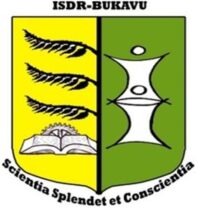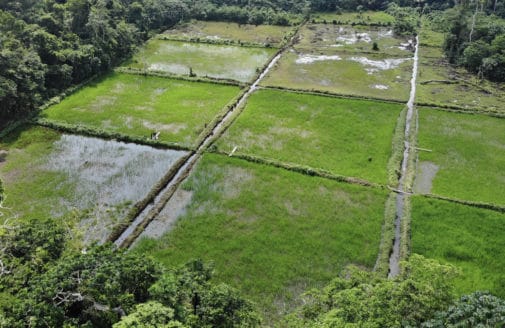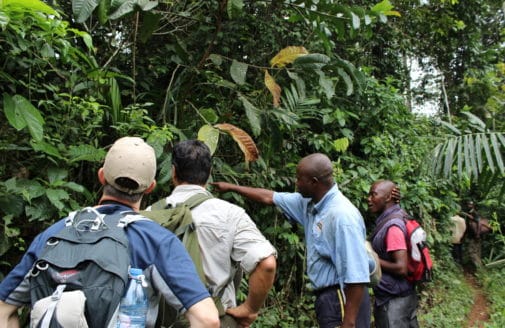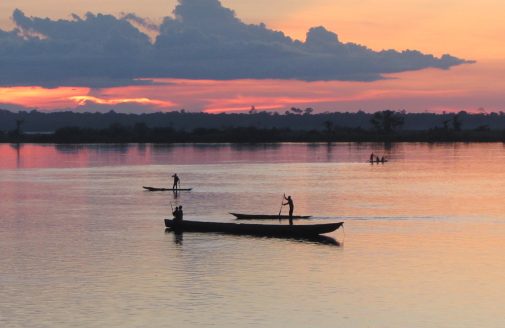photo by Matti Barthel and Joseph Zambo.
- Glenn K. Bush Associate Scientist
- Joseph Zambo Forests & Climate Change Coordinator, Projet Équateur
- Kathleen Savage Senior Research Scientist
- Patrick Fedor Research Assistant
- Ludmila Rattis Assistant Scientist, Tanguro Field Station General Coordinator
- Alexandra Naegele Research Scientist
- Prof. Chris Fleming Dean of Research, Griffiths Business School, Australia
- Prof. Brendan Mackey Director of the Griffith Climate Action Beacon, Griffith University
- Prof. Johan Six Sustainable Agroecosystems Group, ETH Zurich, Switzerland
Most deforestation in the DRC today is driven by the expansion of smallholder farming systems, the principal source of national greenhouse gas emissions.
Each year, the country loses roughly 1,200 square miles of forest (0.20%), and this rate has remained constant over the last decade. The decline in the extent and quality of forests in the region increases food insecurity and destabilizes local markets, making some 6 million rural households progressively more vulnerable to the impacts of global climate change.
Integrating the protection, management, and restoration of both primary forest and biodiversity (nature based climate solutions) within a framework of economic growth and poverty reduction is the key to sustainable development. In the DRC, success in achieving net zero carbon emissions hinges on local community empowerment and participation—not just as passive beneficiaries of policy, but also as active leaders and managers in the process.
Our Work
Projet Équateur aims to promote investment in the conservation and regeneration of forest landscapes and biodiversity, improve livelihoods, and promote economic development in the DRC through scientific research, education, and capacity building.
Since 2011, we have operated Projet Équateur from a base of operations in Mbandaka, the provincial capital of Équateur. We work in partnership with the national and provincial governments, as well as other local stakeholders, to promote scientific approaches to land use planning and management for a low-emissions future. Activities are organized around three key areas:
- Researching investment in improved forest landscape governance and management to assess tradeoffs and create equitable incentives. We share knowledge critical to scaling the implementation of natural climate solutions, and develop measurable standards for a high-integrity carbon market and other performance-based finance.
- Strengthening land use planning and management processes to combat deforestation and biodiversity loss. We are trialing low-input food production technologies to improve food security and nutrition, and reduce the yield gap; introducing new cookstoves to better manage demands on woody biomass; and connecting commodity producers to markets to help generate greater household income.
- Developing models for a “Green Economy” using carbon credits and other performance-based mechanisms to finance sustainable forest landscape management. These include: integrating climate change mitigation and adaptation issues into provincial and national development planning; monitoring and evaluating emission performance from the land sector; and applying benefits sharing and payments for performance mechanisms to incentivize low-emission development.
Impact
This project is helping identify key cost-effective pathways to the lasting protection of 643,000 km2 of primary forests at risk in the DRC, for the benefit of people and nature. Our science supports selecting and scaling pathways to improve food security and income generation for more than 6 million smallholder subsistence farms by developing the operational models and financial mechanisms needed to mobilize national policy and provincial plans for a sustainable forest landscape. These approaches can develop accountability and transparency in public policy and empower local communities to conserve forest resources and drive community development.
For more information, please contact:
Dr. Glenn Bush, Associate Scientist, gbush@woodwellclimate.org, 508-444-1570
Beth Brazil, Senior Director of Foundation Relations, bbrazil@woodwellclimate.org, 508-444-1549
Research area
Partners & Collaborators









